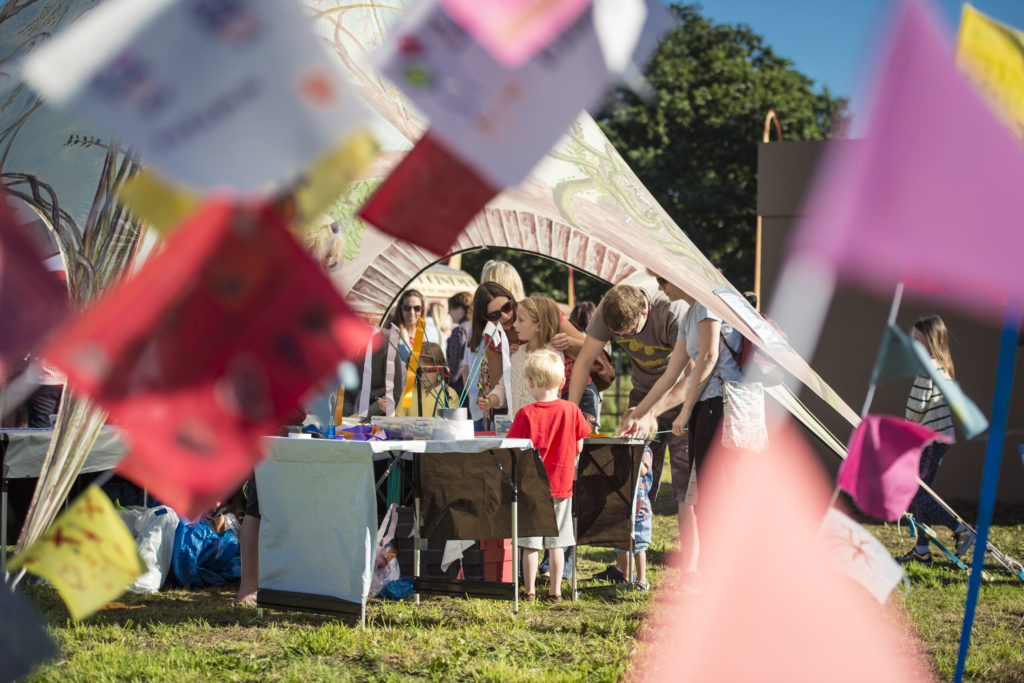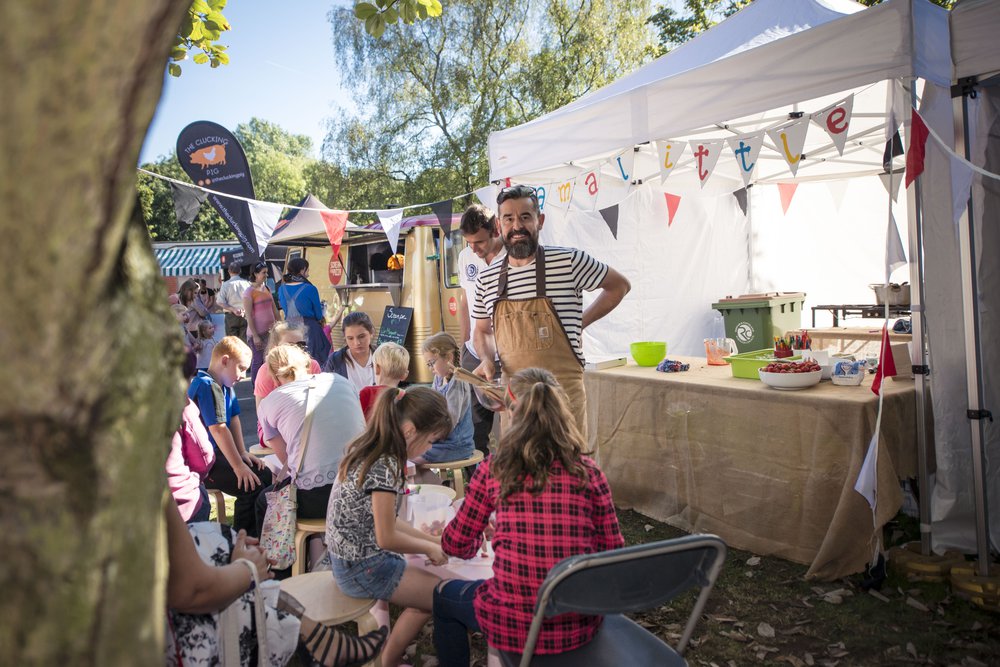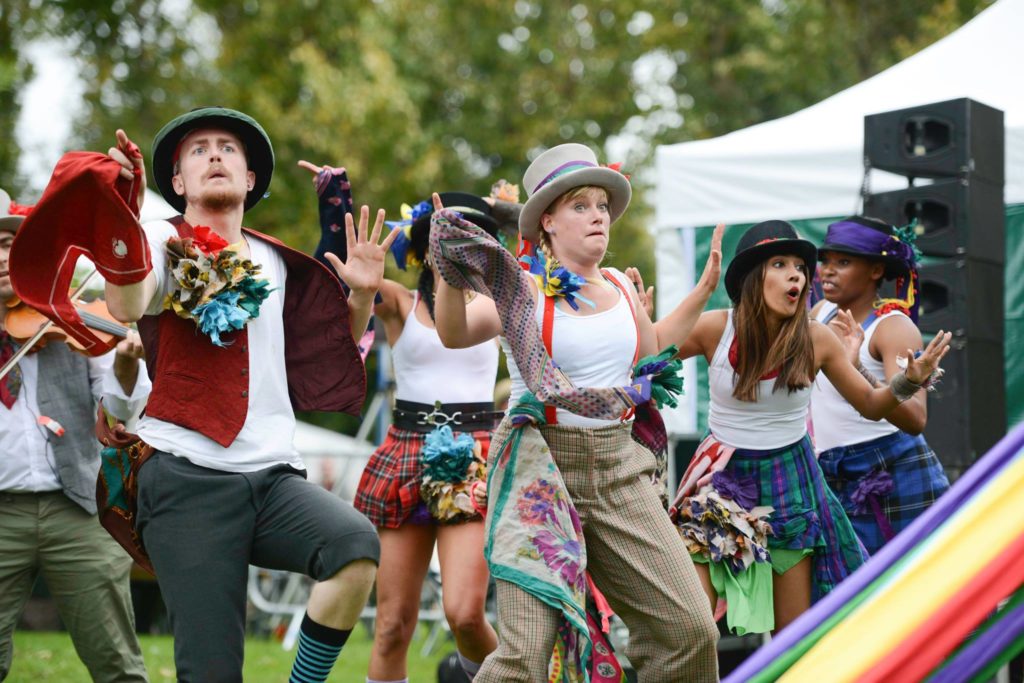
The story of the creation of the Festival of Thrift which turns 10 years old in 2022
In 2011 Gerardine and I were introduced to a chap called John Orchard. He was part of a group of investors who had taken on the enormous, 2 million square foot, Paton & Baldwin’s knitting yarn factory in Lingfield Point, Darlington which was built in 1951. Rather than flatten the site and build a soulless new build, as is so often the case, John lovingly and artistically started to bring these evocative mid-century factory buildings back to life. Now there are over 2500 people working there for dozens of small to medium to large companies, a cool canteen, and nursery and now homes are being built in one of the open spaces on the site. We were taken aback by the attention to detail and couldn’t think of a better example of the upcycling of old industrial buildings in the UK. If it had been in London rather than Darlington it would be being used as an exemplar by Government agencies and the media.
John Orchard said he could do with the world knowing about what was being achieved at Lingfield Point so that his vision of bringing the whole site back into productive use could be achieved. We talked about how holding a significant event on the site that reflected its ethos could do the trick. The concept of The Festival of Thrift was born, the first national festival that celebrates how reusing, recycling and up cycling can be fun, save you money and benefit the environment. A festival that features leading and emerging artists from across the globe, demonstrations, stalls, debates and workshops to offer thrifty advice, tips and tricks as well as innovative tasty food and drink and much more.
A wonderful team, mainly local to Teesside, was assembled by a festival director who shares our passion for sustainability, thrift and hard graft – the wonderful Stella Hall. Stella brought in like-minded production guru David Bilton and the “Dream Team” set about delivering something impactful.
In the run up to the event, most of the media I spoke to questioned if anyone would turn up and if thrift, upcycling and sustainability were just play things for a “yummy mummy” middle-class minority.

The team’s beliefs held firm. To us thrift isn’t about middle-class people making a lifestyle choice, it’s about enacting a real and positive change in the way that society acts and consumes. The generation coming through now is the first that is worse-off than their parents, yet we continue with a culture of mass consumption – having to buy the latest gadget, the biggest TV, new clothes every six months, often with the help of credit. We were clear that the Festival of Thrift is about challenging that attitude and showing that there is another way. This festival was to be all about demonstrating ways to this generation, and many generations to come, that there are ways to enjoy life without spending and borrowing on the scale of the past decades. Nevertheless we were still up against a culture where spending a small fortune on a bag covered in the logo of a French brand and coveting your next door neighbour’s brand new company car is still prevalent. Few would share my absolute pride and delight in the family Toyota Prius approaching 220,000 miles.
On the morning of the first day of the festival, September 21st 2013, the atmosphere was created by the cast of hundreds setting up, laying out their workshops. Their wares were uplifting but we still didn’t have a clue how many folk would turn up. The gates opened at 10.30 am and the public poured in, in their thousands. Over 25,000 people came and the weekend was an uproarious success.
The media were out in force the question of the festivals’ relevance to the wider community of Darlington and beyond was the generally the first one I was asked. None of us had to worry about this, all walks of life turned up. In an article by Kim Stoddart, The Guardian, she wrote a quote which was enough to warm the cockles of any event organiser’s heart:
“The place was teeming with families and young children, and yet despite my best efforts to find one, I was pleased to note there didn’t seem to be a Bugaboo buggy in sight. I think that, at the end of the day, you have to ask why any free event offering practical money-saving advice and ideas, five items of vintage second-hand clothing for a fiver, and free music and entertainment for the whole family, could be seen purely as the domain of the middle classes. It should be for everyone. As it happens, last weekend in Darlington it definitely was.”

Two years on and the event is on the road to becoming a nationally known event, has won the 2015 Observer Ethical Award for Arts and Culture and we have just had the third Festival of Thrift smashing 2014’s 40,000 attendance. The event is one of my highlights of the year.
The festival proves that ‘thrift’ isn’t just a flash in the pan. It’s a genuine response to the economy and the state of the world that is creaking under mass-consumption. This festival concept shows that people want to actively learn how to save money and the planet for a future generation. Thrift isn’t a ‘fashion’ thing among the middle-classes, it’s a change of attitude that transcends the class system. We knew that there are pockets of people who are already making changes and Darlington is one of those places. This festival is a powerful statement to send to everyone. Life isn’t about bling in the form of flash cars, big houses and overpriced clothes; it’s about values, about getting stuck in and enjoying creating the good things in life. Those good things can still feature great design and creativity and can provide a living as evidenced in the dozens of small businesses that make money and make contacts at the event. The Festival of Thrift is about having fun, getting more bang for your buck and working with others to get the best out of life without getting into serious debt.